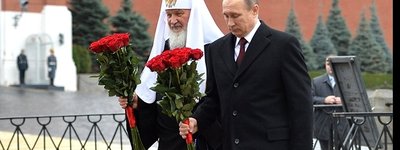The Clerical Abuse Crisis: Not Our Problem?
…while sexual abuse, episcopal cover-ups, and homosexual clergy may be specific to the Latin-rite Church, the broader implications of today’s crisis touch the Ukrainian Greco-Catholic Church too.
Does the clerical abuse crisis in the Roman Catholic Church concern Ukrainian Catholics and Orthodox? As a four-day summit at the Vatican attempts to deal with clerical abuse, Ukrainians will be asking themselves this and other questions.
“Crisis” is an overused word. But few would question its use in this case. Although the Catholic Church has endured worse trials in its long history, this is probably the most serious one in living memory.
The crisis has several aspects. The most scandalous is sexual abuse – whether homosexual or heterosexual. It occurs in different contexts. One is the parish, where the offender is the pastor and the victims are minor parishioners of either sex, typically altar servers. Another is the seminary, where the offender is a superior and the victims are male students. Other possible sites of alleged abuse are convents, monasteries, and church offices.
Another aspect of the crisis is the cover-up. This is typically a matter of inaction, or insufficient or inappropriate action, by the bishop. If there are unproved allegations against a priest, what should the bishop do? What is the proper procedure if the allegations are probably true? Should a guilty pastor be reassigned, and if so, where? Laicization is the extreme remedy; when should it be applied? How should victims be counseled and compensated? When should the civil authorities be involved?
The role of the civilian authorities brings up questions of the relations between church and state. Should the confessional seal be broken in cases of abuse? Should the Church report all cases of abuse to the civilian authorities? The answers will vary from country to country, regime to regime.
Then there is the related matter of an alleged “gay lobby” or “lavender mafia” in the church hierarchy, which has been the subject of much speculation and reports such as that of Archbishop Carlo Maria Viganò. A new book by the well-known French journalist and LGBT activist Frédéric Martel even asserts that homosexuality is an unspoken norm in the institutional Church. How, then, should it be regarded? Some advocate barring homosexuals from the priesthood. And what is the proper pastoral approach to homosexual laity?
The crisis has led some Catholics to call for greater lay involvement in the Church. In a recent article in First Things, Bronwen McShea points out that before the First Vatican Council (1869-70), the lay men and sometimes women had more influence and oversight over the Church. This was particularly so in Apostolic times. While the increased power of the bishops (at the cost of lay participation) has been necessary in modern times, with the Church under attack by secularizing national states, in recent decades this has apparently permitted clerical abuse to grow uncontrolled. (Bronwen McShea, “Bishops Unbound,” First Things, January 2019). In response to Ms. McShea’s article, one reader points out that historically, lay intrusion into church affairs has often been destructive. Another reader, Andrew Willard Jones of Franciscan University at Steubenville, argues that while it may be a good idea to bring back lay involvement, the deeper problem is that the Church’s leadership resembles that of a government or a corporation, where an elite uses a juridical structure to wield coercive sovereign power -- rather than that of a family. (Letters, First Things, March 2019).
Thus, while sexual abuse, episcopal cover-ups, and homosexual clergy may be specific to the Latin-rite Church, the broader implications of today’s crisis touch the Ukrainian Greco-Catholic Church too. This is not only because it is a part of the universal Catholic Church and shares its woes. Nor is it only because one way or another, issues of sexuality are bound to come up in every modern church. It is also because the question of episcopal power and lay participation concern the UGCC – and also the Orthodox Church in Ukraine.
Lay involvement can help prevent or cure forms of abuse other than sexual. In Ukraine, abuse is more likely to be financial. Corruption, after all, is a feature of Ukrainian society from top to bottom. No church can entirely escape it. Identifying and weeding out corruption is among the oversight responsibilities of a bishop. In fulfilling this responsibility, the bishops can benefit from the participation of the laity, including legal and financial experts and investigators. Moreover, by sharing in such oversight, the laity can assure itself that corruption does not affect the bishops themselves.
Lay participation can do more than prevent corruption, however. It can also keep the church from becoming a monolithic, authoritarian institution that ordinary people perceive as alien and threatening. It can help it to be a church of the people, which lovingly leads them to salvation.
Misfortunes often bring about beneficial reforms. If the clerical abuse crisis can lead to increased participation by laymen and women in church governance – in the Latin-rite Catholic Church, the Ukrainian Greek-Catholic Church, and the Orthodox Church in Ukraine – the health of Christianity in Ukraine will benefit.










